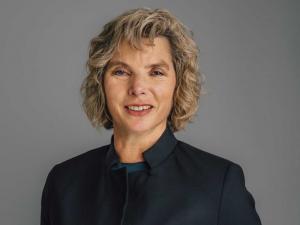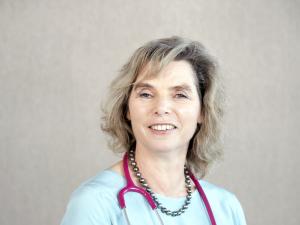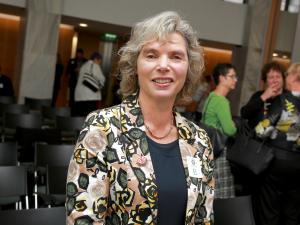Respiratory physician Lutz Beckert considers chronic obstructive pulmonary disease management, including the prevention of COPD, the importance of smoking cessation and pulmonary rehabilitation, and the lifesaving potential of addressing treatable traits. He also discusses the logic of inhaler therapy, moving from single therapy to dual and triple therapy when indicated, as well as other aspects of management
Change boss for GP registrars: Report
Change boss for GP registrars: Report

Here at New Zealand Doctor Rata Aotearoa we are on our summer break! While we're gone, check out Summer Hiatus: Stories we think deserve to be read again! This article was first published on 26 October.
Chosen by Martin Johnston: Amid the praise for the Government commitment to boosting the number of GP trainees and funding pay parity for RNZCGP-employed entrants from 2023, second-year registrar Suzy Cheng’s voice stood out in explaining the joy – and the pay cut – of joining the current programme, and what might have encouraged her to sign up sooner
Our trainees are telling us that...they feel lost and bereft
Te Whatu Ora should take on the employment of GP trainees, according to the report that underpins the Government’s new efforts to improve the training and make it attractive to many more doctors.
Health minister Andrew Little on 4 October announced government funding of initially $7 million a year for a package of GP training improvements and medical-student attachments to general practice.
The package was the result of negotiations with the RNZCGP, based on a report commissioned by the Ministry of Health from research firms Malatest International and Sapere. Dated May, the report, Review of the general practice education programme training funding, was published with the announcement.
Crucially, Mr Little’s media release said the package of changes would see GP trainees “paid as much as their hospital counterparts”.
Junior hospital doctors currently take a pay cut if they choose GP training, partly due to fewer work hours.
What the release doesn’t mention is the 80-page Malatest report’s recommendation that Te Whatu Ora become the employer for general practice training programme (GPEP) registrars in year 1 and possibly year 2, alongside the alignment of GPEP pay and conditions with those of hospital registrars.
“Equivalence may be most effectively achieved if GPEP registrars and registrars in other vocational training programmes have the same employer and employment contracts,” the report says. Te Whatu Ora was identified by the interviewed stakeholders as the potential employer, meaning GPEP registrar terms and conditions of employment could be negotiated directly with the funder.
About 200 doctors enter GPEP1 each year. The plan is to increase to around 300. About three-quarters of GPEP1s are employed by the college; the rest – and registrars in following years – are employed directly by practices.
RNZCGP president Samantha Murton says the college doesn’t oppose the idea of Te Whatu Ora being the employer. But, she says, the big hurdle is Te Whatu Ora would need to negotiate an employment agreement that applies at 200 practices and possibly 350, given that college-employed registrars need to rotate to different kinds of practices.
“You’re contracting with 200 different entities [at which] you have to make sure that the health and safety guidance and standards are all okay, and [which] you have to have a relationship with and also you’re the point of call for any issues that come up.
“The college runs it because we have a relationship with a lot of our practices and our teachers, and it is a natural place for it to fit.”
New Zealand Doctor Rata Aotearoa asked Te Whatu Ora for its response to the proposal it become the employer, and other issues in the report.
Emma Prestidge, interim director, primary, community and rural – national commissioning, says by email, the report has highlighted a number of areas that need to be considered.
“Te Whatu Ora is currently working with Te Aka Whai Ora to consider the Malatest recommendations and no decisions have yet been made.”
The report includes survey results from current and past GP registrars, providing insight into why they chose general practice.
The most highly rated reasons, ticked as “very important” by 63 per cent, were flexible hours and opportunity to train part time, the report says.
“Registrars compared the long rostered shifts in the hospital to the flexibility and work–life balance of general practice. Flexibility and family-friendly hours were particularly attractive to registrars who had young families or wanted to start families.”
Along with flexible and family-friendly hours comes the lower income, the report noted.
Registrar feedback about their educational experiences in GPEP1 was positive. However, most of the registrars and other stakeholders interviewed felt the educational/teaching component of GPEP2 was inadequate.
The registrars wanted more frequent peer and mentor sessions focused on case reviews. And many thought the clinical component of the exam at the end of GPEP1 should be delayed to the middle of GPEP2.
The level of support for GPEP2 and 3 registrars was described to the report’s researchers as “almost nonexistent and particularly dangerous for registrars who needed additional learning and training to pass exams”.
Dr Murton contrasts year 1 and its weekly seminars to year 2 “group meeting every six weeks”.
“Our trainees are telling us that in years 2 and 3 they feel lost and bereft, and that’s real.”
The college runs the six-weekly GPEP2 programme with the “nominal” funding provided in year 2 but there’s no funding for in-practice supervision by senior colleagues.
That only happens out of the goodwill of those colleagues.
You can hear the sigh of relief in Suzy Cheng’s voice as she describes her happy landing in GP training. Now in her second year of the three-year General Practice Education Programme (GPEP), Dr Cheng parachuted in from being a non-training surgical registrar who was striving to get onto a surgical training programme.
This was a tough assignment by Dr Cheng’s account.
“I was really unhappy with my job at the hospital,” she says. “The long hours – some proper long hours – and the high stress and big, big teams where you never quite know anyone but you meet a lot, where the patients that come in, you fix a problem, then you send them on their way.”
Eventually the stress drove her out. Pregnant with her daughter Freya, she realised she would hardly ever see her baby if she stayed in her hospital job. Her husband would have to take a step back from his job or they would have to hire a nanny.
But she didn’t know what to expect in general practice – she had only had a short placement while a student – and the training programme delivered a series of shocks. One was the pay.
“I took a staggering pay cut,” says Dr Cheng, who is 32 and has a mortgage. “It was well below half of what I was making at the hospital, minus a lot of the perks.”
Another shock was learning the skills of general practice.
“I spent years doing surgery so the idea of general medicine, like GP medicine, just scared me. I couldn’t even remember how to manage a simple urine infection, because that’s not what you did as a surgeon.
“But the [GPEP1] training was so good. It was well structured. I felt well supported. The GP college – the Christchurch team – went above and beyond to make sure that we felt well looked after, which was quite different for me, quite a shock. Surgical specialties aren’t very good at looking after people.
“On top of that there was the flexibility of my hours. I had no evening shifts, I had no night shifts, I had minimal weekend shifts. I could suddenly start planning my life again…I think there is just so much going for GP training. It’s just a shame the junior doctors at the hospital don’t necessarily see it.”
Dr Cheng works at Halswellhealth in Christchurch, where her supervisor is always available to talk with her. But she also says some of her GPEP2 colleagues have not been so fortunate.
She lauds the new funding for expanding GP training and the exposure of medical students to general practice. She thinks that if she had learned earlier what general practice really is, she may have signed up sooner.
“When you get to see the patients and their families again and again and learn about their lives – for me, that’s what medicine was always about; learning and walking with my patients along a journey, helping them when they want help and giving them support in the ways that they seek it."










![Barbara Fountain, editor of New Zealand Doctor Rata Aotearoa, and Paul Hutchison, GP and senior medical clinician at Tāmaki Health [Image: Simon Maude]](/sites/default/files/styles/thumbnail_cropped_100/public/2025-03/Barbara%20Fountain%2C%20editor%20of%20New%20Zealand%20Doctor%20Rata%20Aotearoa%2C%20and%20Paul%20Hutchison%2C%20GP%20and%20senior%20medical%20clinician%20at%20T%C4%81maki%20Health%20CR%20Simon%20Maude.jpg?itok=-HbQ1EYA)
![Lori Peters, NP and advanced health improvement practitioner at Mahitahi Hauora, and Jasper Nacilla, NP at The Terrace Medical Centre in Wellington [Image: Simon Maude]](/sites/default/files/styles/thumbnail_cropped_100/public/2025-03/2.%20Lori%20Peters%2C%20NP%20and%20advanced%20HIP%20at%20Mahitahi%20Hauora%2C%20and%20Jasper%20Nacilla%2C%20NP%20at%20The%20Terrace%20Medical%20Centre%20in%20Wellington%20CR%20Simon%20Maude.jpg?itok=sUfbsSF1)
![Ministry of Social Development health and disability coordinator Liz Williams, regional health advisors Mary Mojel and Larah Takarangi, and health and disability coordinators Rebecca Staunton and Myint Than Htut [Image: Simon Maude]](/sites/default/files/styles/thumbnail_cropped_100/public/2025-03/3.%20Ministry%20of%20Social%20Development%27s%20Liz%20Williams%2C%20Mary%20Mojel%2C%20Larah%20Takarangi%2C%20Rebecca%20Staunton%20and%20Myint%20Than%20Htut%20CR%20Simon%20Maude.jpg?itok=9ceOujzC)
![Locum GP Helen Fisher, with Te Kuiti Medical Centre NP Bridget Woodney [Image: Simon Maude]](/sites/default/files/styles/thumbnail_cropped_100/public/2025-03/4.%20Locum%20GP%20Helen%20Fisher%2C%20with%20Te%20Kuiti%20Medical%20Centre%20NP%20Bridget%20Woodney%20CR%20Simon%20Maude.jpg?itok=TJeODetm)
![Ruby Faulkner, GPEP2, with David Small, GPEP3 from The Doctors Greenmeadows in Napier [Image: Simon Maude]](/sites/default/files/styles/thumbnail_cropped_100/public/2025-03/5.%20Ruby%20Faulkner%2C%20GPEP2%2C%20with%20David%20Small%2C%20GPEP3%20from%20The%20Doctors%20Greenmeadows%20in%20Napier%20CR%20Simon%20Maude.jpg?itok=B0u4wsIs)
![Rochelle Langton and Libby Thomas, marketing advisors at the Medical Protection Society [Image: Simon Maude]](/sites/default/files/styles/thumbnail_cropped_100/public/2025-03/6.%20Rochelle%20Langton%20and%20Libby%20Thomas%2C%20marketing%20advisors%20at%20the%20Medical%20Protection%20Society%20CR%20Simon%20Maude.jpg?itok=r52_Cf74)
![Specialist GP Lucy Gibberd, medical advisor at MPS, and Zara Bolam, urgent-care specialist at The Nest Health Centre in Inglewood [Image: Simon Maude]](/sites/default/files/styles/thumbnail_cropped_100/public/2025-03/7.%20Specialist%20GP%20Lucy%20Gibberd%2C%20medical%20advisor%20at%20MPS%2C%20and%20Zara%20Bolam%2C%20urgent-care%20specialist%20at%20The%20Nest%20Health%20Centre%20in%20Inglewood%20CR%20Simon%20Maude.jpg?itok=z8eVoBU3)
![Olivia Blackmore and Trudee Sharp, NPs at Gore Health Centre, and Gaylene Hastie, NP at Queenstown Medical Centre [Image: Simon Maude]](/sites/default/files/styles/thumbnail_cropped_100/public/2025-03/8.%20Olivia%20Blackmore%20and%20Trudee%20Sharp%2C%20NPs%20at%20Gore%20Health%20Centre%2C%20and%20Gaylene%20Hastie%2C%20NP%20at%20Queenstown%20Medical%20Centre%20CR%20Simon%20Maude.jpg?itok=Z6u9d0XH)
![Mary Toloa, specialist GP at Porirua and Union Community Health Service in Wellington, Mara Coler, clinical pharmacist at Tū Ora Compass Health, and Bhavna Mistry, specialist GP at Porirua and Union Community Health Service [Image: Simon Maude]](/sites/default/files/styles/thumbnail_cropped_100/public/2025-03/9.%20Mary%20Toloa%2C%20Porirua%20and%20Union%20Community%20Health%20Service%20in%20Wellington%2C%20Mara%20Coler%2C%20T%C5%AB%20Ora%20Compass%20Health%2C%20and%20Bhavna%20Mistry%2C%20PUCHS%20CR%20Simon%20Maude.jpg?itok=kpChr0cc)